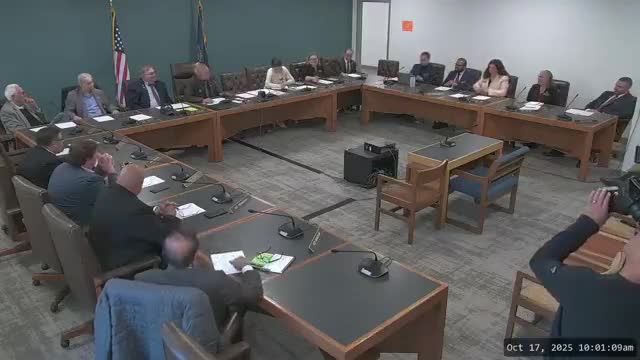State committee adopts five‑state trigger amendment but votes ITL on ‘Defend the Guard’ bill
Get AI-powered insights, summaries, and transcripts
Subscribe
Summary
A House committee on state‑federal relations considered HB104FN, a measure that would require a formal declaration of war before New Hampshire’s National Guard could be activated overseas. Members approved an amendment that delayed the bill’s effective date until five states adopt similar laws, but later voted the bill inexpedient to legislate.
The State‑Federal Relations and Veterans Affairs Committee on Oct. 19 considered HB104FN, a bill that would require an official declaration of war before the New Hampshire National Guard can be activated in a foreign country. Representative Tom Mannion, prime sponsor of the bill, moved the committee to adopt amendment 2025‑3007H, which would delay the bill’s effective date until the statute is enacted in a total of five states including New Hampshire.
The amendment passed on a roll call vote of 12‑5. Representative Mannion, who described the amendment as a way to build momentum in other states, told the committee, “If the bill passes, it will not immediately go into effect. It will instead go in effect once New Hampshire and 4 other states … join us.” He said the change was intended to reduce the risk that the measure would be dismissed by the other legislative chamber as a solitary, symbolic act.
Opponents raised concerns about legal and practical consequences of the measure. Representative Belcher argued the bill rests on a contested reading of federal law and warned that tying state law to a broader interstate test would undercut New Hampshire’s own sovereignty argument. Representative Seibert and Representative Lloyd said the bill raises questions about service contracts, benefits and whether federal funding or missions could be affected; Lloyd specifically cited potential local economic impacts tied to Pease Air National Guard operations.
Committee discussion repeatedly returned to questions about federal response and possible fallout if state and federal law conflict. Committee staff produced a fiscal note estimating potential costs of about $55,000,000; committee leadership said that figure would likely trigger further review by the House Finance Committee if the bill advanced.
After further debate, the committee first voted on the underlying motion “ought to pass as amended,” which failed 6‑11. Representative Seibert then moved that the committee report the bill as inexpedient to legislate (ITL). That motion passed 11‑6, sending the committee’s recommendation against the bill.
Supporters emphasized the bill’s purpose as reasserting congressional war‑making authority and protecting state guard forces from long overseas deployments without a formal declaration. Representative Mannion recounted deployments and battlefield incidents he said motivated the legislation and said, “If any kids come up and ask me … make sure that our house is in order in DC before you sign on that contract.”
Opponents and some veterans’ organizations argued the bill could jeopardize personnel benefits, complicate mutual aid for disasters, and invite costly legal battles with the federal government. Representative Belcher said litigation would be the likeliest resolution if a state law conflicted with federal authority: “It goes to the courts,” he said, noting the Supreme Court would have original jurisdiction in a state‑federal dispute.
The committee’s vote concludes this round of consideration; the record shows the membership divided on constitutional and practical grounds. The sponsor and others indicated intent to continue advocacy outside the committee, while other members said a nonbinding resolution would better raise awareness without creating the legal risks members worried about.
Votes at a glance - Amendment 2025‑3007H (delay effective date until five states, including NH): passed 12‑5 (mover: Rep. Tom Mannion; seconder: Rep. Gagne). - Motion “Ought to pass, as amended” (OTPA): failed 6‑11 (mover: Rep. Tom Mannion; seconder: Rep. Gagne). - Motion report ITL (Inexpedient to Legislate): passed 11‑6 (mover: Rep. Seibert; seconder: Rep. Lloyd).
What the bill would do (as discussed at the hearing) HB104FN would require an official declaration of war as a trigger for activating the New Hampshire National Guard for deployment in foreign states. The bill, as introduced, includes a 60‑day effective period after passage; amendment 2025‑3007H added a new section stating the act would not take effect until at least five states (New Hampshire plus four others) have enacted materially similar laws.
Why it mattered to members and witnesses Supporters framed the bill as a constitutional correction and a safeguard for guardsmen who join expecting to serve primarily in state or domestic roles. Opponents and some military leaders and veterans groups warned the measure could have unintended consequences for benefits, mutual aid, basing and readiness, and could trigger expensive litigation with the federal government.
Next steps The committee’s majority recommended ITL. If the bill were to pass the full House despite that recommendation, members said the fiscal note and potential federal conflicts would likely send the measure to House Finance for further review, and the issue could ultimately be litigated in federal court.
